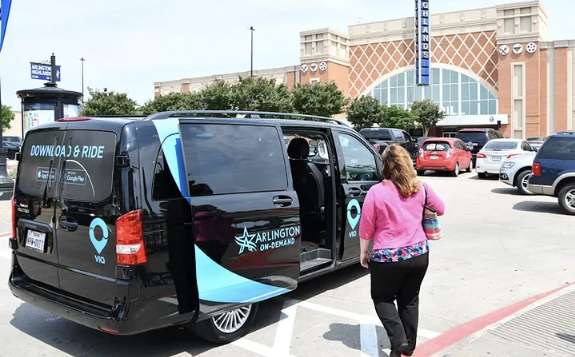Arlington, Texas, USA
In Arlington, a Can-Do City Connects and Communicates with Data.
Project Type:
Community Engagement, Communications, Cross Sector Collaboration, Finance, High-Performing Government, Infrastructure, Transportation
2019 Silver Certification & 2020 Gold Certification
At a Glance
Partnered with researchers, developers, students and entrepreneurs to explore real-world applications of city data that could solve community issues, provide targeted services or spur investments.
Open Arlington Portal allows residents to explore data through interactive maps to better understand their community, encouraging data transparency and public engagement.
Used data to identify and secure federal funding for an innovative solution for their residents and visitors public transit needs through a partnership with rideshare company Via.
Helping Residents Understand their H2O Intake
Last year’s dry summer in Arlington, Texas came as the City reached the halfway point in a 10-year project to install remotely read water meters throughout the community. Soon a controversy emerged, largely driven by posts on social media: Some households had been receiving higher water bills, and residents wanted to know if it was a result of the new technology.
The short answer was no, but officials knew that overcoming such speculation would demand a longer explanation. The City immediately set about to pull historical data showing that increased water use and, thus, higher bills were in alignment with seasonal fluctuations during warmer months. The City also ensured residents had a greater understanding of how their bills are determined, including that the cost of water per 1,000 gallons rises as residents reach higher levels of consumption.

But Arlington didn’t stop with an explanation — it also looked to empower residents with information. The City launched the Know Your H20 website so that residents can view their billing history over the past two years, compare usage across temperature changes, and monitor their consumption on a daily basis. The City also released new data on its open data portal, allowing residents to see water usage by zip code and filter by the type of meter the information came from. And they got the word out about these new tools via a Know Your H20 communications campaign.
Making Data Relatable
Look across nearly any of Arlington’s efforts, and you’ll notice a similar trend: Fostering transparency and building an effective local government only scratch the surface of the City’s goals for using data and evidence. Beneath that is a desire for helping residents find and use publicly available information to ask questions, understand, and engage. Arlington’s open data progress goes beyond both policy and portal to people, and the key to making that leap has been the City’s extensive communications efforts.
Director of Communication and Legislative Affairs Jay Warren doesn’t mince words when he says, “Just to be blunt, data can be boring.” But he and his team are undaunted as they turn to stories, graphics, and other digestible and engaging forms of content to make data interesting. Moreover, communications isn’t an afterthought in the City’s data-driven strategy; Communication Coordinator Susan Schrock sits on the City’s data governance committee, for example, and this integrated approach has great support from city leadership.
“When we talk about innovation and open data, a lot of people think this is rocket science, but it’s really not — it’s really basic. So if we can take the data that comes out of complex systems, simplify the messaging, then relate it on a human level to our residents, to me that’s what it’s all about.”
Breaking Down the City Budget
One thing practically every resident relates to is how their tax dollars are being spent. As a well-managed city, Arlington makes budget allocations based on data, which is fundamental for building the community’s confidence in City Hall.
The City’s budget portal allows residents to drill down into investments, and Arlington bolsters its transparency with efforts to help residents fully understand the City’s finances, such as the recent Budget in Action campaign. The campaign included assets such as a video inviting residents to get to know the 2019 operating budget and a Taxpayer Investment Value Guide that made the budget’s large dollar amounts relatable by comparing them to the average household’s expenses. By the end of the campaign, a quarter of the population had engaged with budget content in some way. And Arlington is continuing to provide regular updates on the five City Council priority areas outlined in the budget through newsletters, videos, social media, and more.
Public Transit Takes a Fresh Turn
Data analysis has also helped the City make informed decisions about when to stop funding initiatives. Until six years ago, when Arlington launched its single-route MAX bus, the city was the largest in the country without a public transportation system. Officials anticipated that the bus would be used for around 600 rides each day, but actual numbers only reached around half that. As it turned out, because Arlington’s 400,000 residents are spread out across the city’s nearly 100 square miles, the community lacked the density necessary along the bus’s corridor to drive ridership to a level that would offset the investment. The bus service was discontinued, but the need for public transportation remained.

Identifying a creative way to meet that need, the City partnered with Via, an on-demand rideshare company. Residents can use the Via app to instantly book a seat in shared vehicles with flexible routes that currently cover about one third of the city and are due to expand. (For residents without smartphones or who don’t wish to use a credit card, the service has alternate scheduling and payment options.) In one recent week, residents took more than 4,500 rides using the service. Because of the City’s ability to provide data collected with Via, Arlington is one of the only cities in the country receiving Federal Transportation Administration grant funding to support its Via public transit alternative.
Residents Using Data
Finding this innovative, data-driven solution is just one demonstration of why city officials call Arlington “a can-do city.” And residents are following their lead. They’re using their Amazon Alexa-enabled devices to ask questions, such as where to find their voting location, that are answered via open data. A group of teens participating in an Arlington Public Library coding program recently borrowed an idea from Code for Anchorage, creating an online game, based on city data, that lets players guess the most popular dog names in town. And Matthew Taylor, a local developer, has used city data to create a site that allows residents to quickly determine their trash day.
“I’m 100 percent in favor of every city doing this. It could change how people live. If someone can find that one application that really does improve someone’s life, that can make a difference. And Arlington is supporting that.”